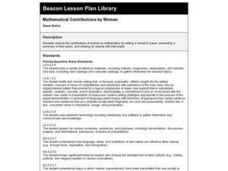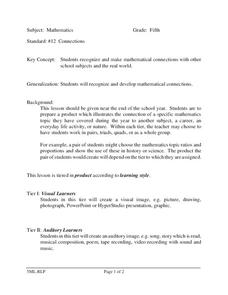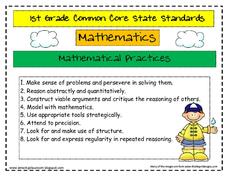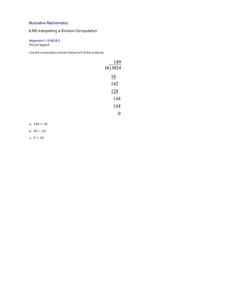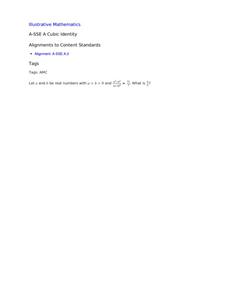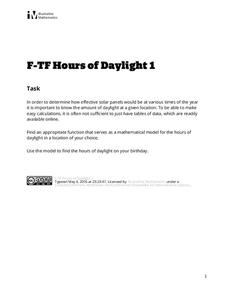Curated OER
Mathematical Contributions By Women
Third graders explore the contributions of women to mathematics by writing a research paper, presenting a summary to their peers, and sharing an activity with their peers. They use a variety of reference materials to gather information...
Illustrative Mathematics
Why Does SSS Work?
While it may seem incredibly obvious to the geometry student that congruent sides make congruent triangles, the proving of this by definition actually takes a bit of work. This exercise steps the class through this kind of proof by...
Curated OER
A is for Area, B is for Billion
Students use important math vocabulary by creating an illustrated storybook. They become familiar with the mathematics terms they encounter on a standardized test and connect these words to the world around them.
Curated OER
Connections
Fifth graders create a musical composition, a drawing, or a 3D structure to show how math connects to other subjects. In this math and other subjects lesson plan, 5th graders present their presentations to the class and explain the...
Curated OER
Discovering Math-Concepts in Advanced Algebra
Students research The Nine Chapters on the Mathematical Art and Chinese contributions to mathematics using both print and non-print sources. From their research they create an illustrated table of contents for each chapter of the Nine...
Curated OER
Mathematics of Image Processing
For this mathematics of image processing worksheet, students solve 10 various types of problems related to image processing on a computer. They type in all the commands listed and figure out what is going on. Then, students determine the...
Curated OER
Using Parallel Axes To Discover Mathematical Interconnections
In this math worksheet, students graph the functions on parallel axes and observe the location of the slope point in relation to the x and y axes.
Curated OER
Common Core State Standards 1st Grade Math
Here are the complete set of the math practice standards and the Common Core standards for first grade. They cover operations & algebraic thinking, operations in base 10, measurement and data, and geometry. Illustrated nicely with...
Odyssey of the Mind
Odyssey of the Mind Curriculum Activity: Mathematicus Dramaticus
The best part about this resource is that you've got four wonderful activities to choose from. Each of the projects can work together or on its own to help learners understand the history of math and how it can be seen every day. In...
Curated OER
Identity, Inverse, and Equality Properties
In this properties instructional activity, 9th graders solve and complete 29 various types of problems that include identifying various types of properties. First, they give an example of each property named. Then, students name the...
Curated OER
Comparing Fractions
Learners compare three sets of fractions using the greater than, less than, and equal signs. To justify their answers, a drawing is also required that illustrates their reasoning. Including fractions with like and unlike denominators, as...
Illustrative Mathematics
Identifying Rational Numbers
Eight different numbers are listed for mathematics masters to analyze. They simply tell if each number is rational or irrational. They can also explain their reasoning. A simple and straightforward learning exercise that is a handy tool...
Illustrative Mathematics
Seven Circles III
A basic set-up leads to a surprisingly complex analysis in this variation on the question of surrounding a central circle with a ring of touching circles. Useful for putting trigonometric functions in a physical context, as well as...
Education Development Center
Rational Exponents
It's rational to root for your class to learn about exponents. Scholars study rational exponents by reading a fictional dialogue between classmates. They analyze the conversation to understand the connection between rational exponents...
Illustrative Mathematics
Drinking Juice, Variation 3
It is up to the learner to find the amount of juice originally in a bottle, knowing what fraction of the juice is left, and the amount that has been consumed. The accompanying commentary provides a useful and detailed description of...
Illustrative Mathematics
Ordering 4-digit Numbers
Place value is a concept that sets a foundation for mathematical understanding. Ordering these sets of three- and four-digit numbers will help to strengthen that foundation. A great independent practice worksheet or short assessment to...
Illustrative Mathematics
Interpreting a Division Computation
Mathematicians show their understanding of a division problem. If a student can apply long division to a pair of numbers and determine a quotient, what other factors and multiples become apparent? The example illustrates a simple...
Illustrative Mathematics
Naming the Whole for a Fraction
How many different ways can you represent a whole? In a picture that represents six parts (two of which are shaded), learners are asked to label the parts appropriately to show how three different mathematical interpretations can be...
Illustrative Mathematics
An Integer Identity
Challenge algebra learners to use the difference of cubes to solve this problem. Once your charges have taken out the factor (a - b), combined the like terms and set them equal to zero, the problem becomes a factorable quadratic...
Illustrative Mathematics
The Locker Game
Here is a learning activity that incorporates a classic puzzle in mathematics. Young mathematicians are guided through a series of statements that describe rounds of pupils opening and closing lockers. The first person opens all 20...
Curated OER
The Random Walk II
Deep mathematical thinking is found with just a coin and a number line. Combining computing some probabilities in a discrete situation, and the interpretation of a function, this simple task gives learners a lot to think about on...
Curated OER
Cantor Set
Discover an interesting mathematical object that your algebra learners will enjoy investigating. Their adventure will lead them to the generation of a finite geometric series.
Illustrative Mathematics
Hours of Daylight 1
The midline of the mathematical model of the number of hours of sunlight is not 12 hours. Pupils use the modeling cycle to determine a function that will model the number of hours of sunlight at a location of their choosing. Using...
Institute of Electrical and Electronics Engineers
Coloring Discrete Structures
What's the least number of colors needed to color a U.S. map? The lesson begins by having pupils view a video clip on continuous and discrete phenomenon, then launches into an activity reminiscent of Zeno's paradox. A separate video...
